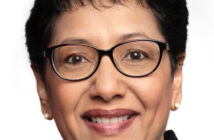 Having just wrapped up the second annual Women in Security Lecture Series, the Canadian Security Partners’ Forum (CSPF) is busy preparing for next year’s event after being inundated with requests for information.
Having just wrapped up the second annual Women in Security Lecture Series, the Canadian Security Partners’ Forum (CSPF) is busy preparing for next year’s event after being inundated with requests for information.
Attended by more than 270 professionals on the 7th February in Canada, CSPF Executive Director, Ms Bonnie Butlin explains that the CSPF wanted to create a common platform to bridge and bring together the unique segments of security.
The CSPF represents an agile network of security associations operating across Canada with the purpose of enabling enhanced communication and collaborative opportunities.
“A function of the CSPF is being able to examine security issues more broadly than any of its associations by themselves or in combination, yet being able to go deep into the issues by bringing together the key experts in the areas in question,” Ms Butlin said.
Butlin believes that building security capacity and resilience is essential and while she says that it may be difficult to think long-range beyond short-term pain in these times of fiscal restraint and cuts, she sees it as a need in the Canadian security landscape.
“In our field it is essential to keep the strategic goal in sight, particularly when threat networks are working on time horizons counted in centuries not years. We need to close that gap.”
“The Women in Security Lecture Series is filling a need in the Canadian security landscape in terms of bringing disparate elements of the Canadian security capacity together and highlighting convergences among them.”
This year’s event was highly anticipated with a panel of speakers covering a range of disciplines and domains, including: cyber, national security, physical security and risk management, academia and law enforcement, portfolio management, critical infrastructure and more.
“Women are integral to the Canadian security effort and the Women in Security theme, which is both positive and neutral, is supported by the Canadian security community, particularly among the Canadian military.”
Butlin’s passion in Political Science and International Affairs developed at a young age, growing up in a family where the key value was character, with an expectation that this was to be demonstrated through the military or law enforcement.
“There was also an expectation that character would be demonstrated through personal choices and conduct that was reflective of patriotic service, individual contribution to the greater good, and a commitment to making hard decisions and acting on what one believes is true and right.”
Butlin explains that these expectations were informed by a combination of strong British and Irish military tradition; German Christian influence in terms of charitable service, emphasis on truth, and family pride; and Métis culture, with its emphasis on personal autonomy in decision-making and action, and personal responsibility to the community through giving of self.
“I have heard the name ‘Butlin’ traces back to a French aristocratic line, and means ‘kick the villain’. In my line of work I would like to think that that element has carried through as well.”
As a child, Butlin lived with the tensions associated with her mother being German and her father’s family who had every male member in two generations fight in WWI and WWII.
“We moved frequently within Canada due to my family’s law enforcement postings and I became increasingly aware of the conflicts among ethnic and class groups within Canada, and over time my interest in security and national
issues grew.”
“The family imperative for service and high expectations for managing the complexities of one’s choices and loyalties made a lasting impression on me and continue to shape the way that I approach complex relationships today.”
Focussing her bachelor’s studies on terrorism, military strategy, nuclear containment theory, power politics and advanced Machiavellian theory, Butlin went on a slightly different direction during her graduate studies after the 9/11 attacks towards counterinsurgency and counterterrorism and complex threat networks.
While Butlin acknowledges that problems are becoming more complex, she believes that by working harder, being more creative and communicating more effectively – a place where the CSPF will be critical – are all key to fighting complexity.
“People and communication are key in fighting complexity. We are seeing real results with the Forum network so I am more convinced of the need for networking than ever.”
“Building networks is critical, we hear this all the time but in security, defence and intelligence, and in going up against complex threat networks, friendly networks are essential.”
In addition to working with security-related associations that represent all the domains of security the CSPF works across a variety of vectors including government, professionals, educators, and is also drawing the attention and participation of international partner states in a collaborative and comprehensive security approach.
“The CSPF network is a catalyst for bringing previously siloed elements of the security, defence and intelligence communities together, toward building Canadian capacity and promoting seamless interactions amongst disciplines and personnel.”
 “As I see it, we are all playing on the same team.”
“As I see it, we are all playing on the same team.”
Editor’s Note: APSM was proud to be a media partner to CSPF Women in Security Lecture Series and welcomes information on any similar initiatives in the Asia Pacific region.





